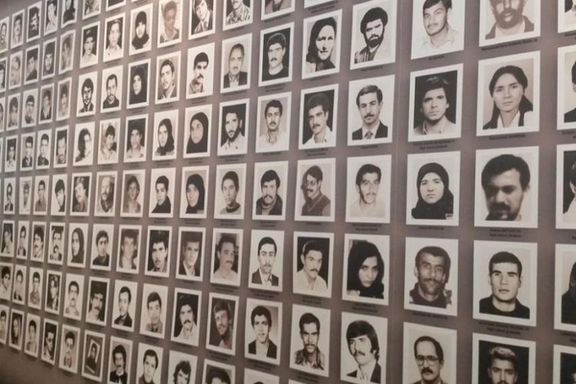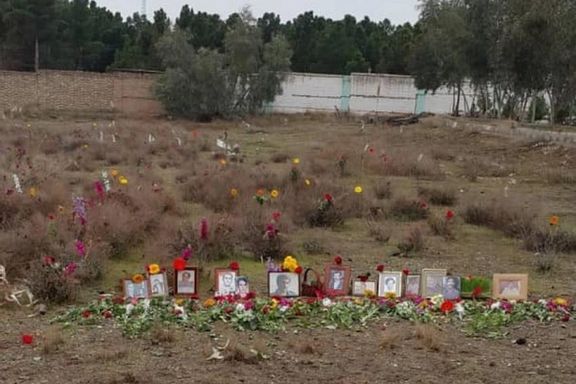Two Men Who Went Home: One Died In Prison, One Rose To Power

Lawdan Bazargan whose brother was executed as a political prisoner in Iran in 1988, argues that a diplomat who defended prison killings should not teach in a US college.

Lawdan Bazargan whose brother was executed as a political prisoner in Iran in 1988, argues that a diplomat who defended prison killings should not teach in a US college.
-------------------------------------------------------------------------------------------------------------------------
It's been 33 years, and I still don't know where my brother is buried: and I am not the only one. The families of thousands of victims of the 1988 prison massacre in Iran have never received so much as an acknowledgment from the regime that it ever happened. Moreover, one of the top diplomats from that time, who was covering up the crime, now flourishes as a professor at a top American college. The school has so far refused to hold him accountable. Americans committed to human rights should refuse to be silent. It's time Mohammad Jafar Mahallati, the so-called peace professor at Oberlin College, answer for his crimes.
When the Iranian Revolution happened in 1979, my brother Bijan was a college student in London. He was a brilliant man with his whole life ahead of him. At the same time, Mahallati—now a professor at Oberlin College in Ohio—studied in a college in the United States. Despite my parents' pleas, Bijan returned home soon after the revolution to help rebuild his homeland. He joined one of the country's leftist parties challenging the oppressive Islamic regime that weaponized religion to suppress dissident voices and was soon arrested, jailed, and tortured for years without an indictment.

Meanwhile, Mahallati returned to Iran too and climbed the political ladder. He was named spokesman for the Islamic Republic of Iran's Foreign Ministry, preaching the virtue of Islamic values and becoming one of the faces of the Islamic regime's brutality.
Bijan eventually received a 10-year prison sentence for being a member and supporter of a leftist party. Though he suffered extreme physical and psychological abuse in prison, going on a hunger strike with fellow detainees to demand better conditions, and being denied badly needed care for a medical condition, my family and I maintained hope that we would someday reunite.
That all changed in the summer of 1988, six years and three months into his sentence, when Bijan and thousands of other political prisoners were executed by the Iranian government based on a Fatwa (Islamic Decree) issued by Ruhollah Khomeini, the Supreme Leader. Bijan was buried in an unmarked mass grave. The year prior, while my brother unjustly languished in prison, Mahallati was promoted to Iranian ambassador to the United Nations. Amnesty International estimates that 5,000 political prisoners were murdered in the summer of '88 extrajudicial killings.

For the past 12 years, as a religion professor at Oberlin College, Mahallati has been helping shape the minds of American students. But the fact remainsthat by November 1988, the regime Mahallati represented at the UN was partly denying and partly justifying the executions. And despite a resolution by the UN General Assembly that expressed "grave concern" about "a renewed wave of executions in the period July-September 1988," Mahallati, in his official capacity, said the resolution was based on "fake information."
Political dissidents in Iran remain under threat of unlawful imprisonment or death, yet the eyes of the world stay closed to their struggle. As Iranian freedom of speech activist and blogger Hossein Ronaghi recently wrote in the Wall Street Journal, "For us, it is as if there are two Irans—the one where we live and another that you read about. Your Iran is defined by a pesky nuclear negotiation. Ours is much worse. It is a religious police state where we live in fear, with countless red lines that most dare not cross. It is a country of repression, censorship, and violence."
This isn't a story about so-called "cancel culture" or free speech on college campuses: this is about human rights as a beacon of hope and applying a standard of treatment to all people, no matter where they're born. In a letter to Oberlin President Carmen Twillie Ambar on October 8, 2020, which still remains unanswered, I joined other family members of those killed by the government Mahallati represented, “We want Mahallati removed from his post, we want an apology, and we want to know how someone with Mahallati's past could rise to prominence at such a prestigious institution.”
I cannot sit idly by while Mahallati preaches peace when he's done so much to disrupt it. When I went to the Oberlin campus the first week of November, I hoped the administration would meet with family members of the victims and me on behalf of Bijan and thousands of others who gave their lives for a better world. Unfortunately, the administration decided to ignore us once again.
As an Iranian-American, I have long watched the human rights abuses back home viewed as a sideshow to broader international policy fights. But most difficult of all has been watching Americans who say they're committed to protecting human rights ignore the Iranian people's suffering—past and present. Human right is not a leftist issue or a conservative issue; it is the moral rod that should guide us all.
Opinions expressed by the author are not necessarily the views of Iran International.